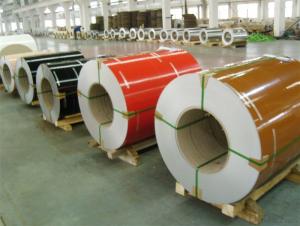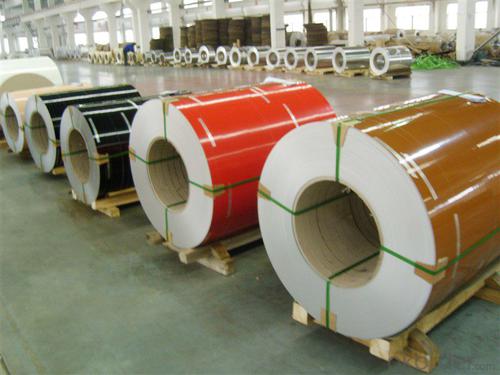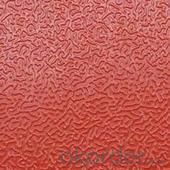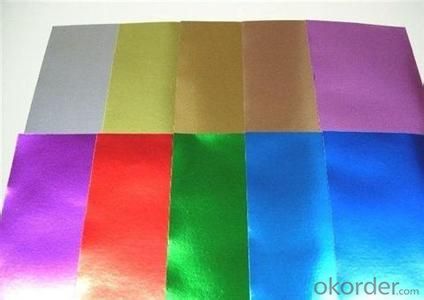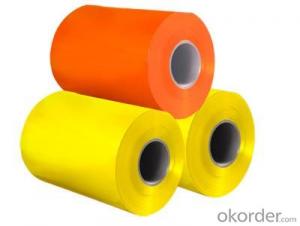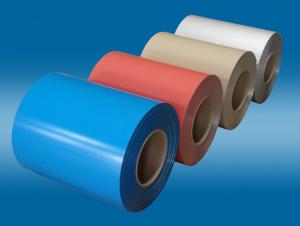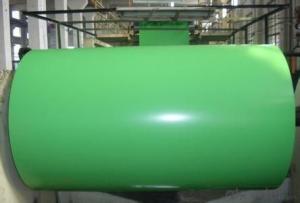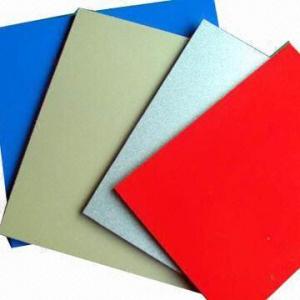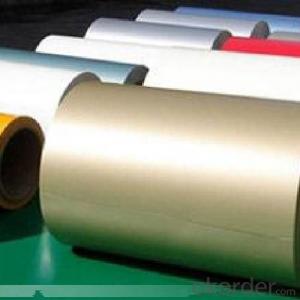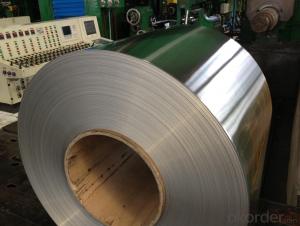Aluminum Sheet and Coil - Prepainted Aluminum Sheet/Coil Hot Sale
- Loading Port:
- Shanghai
- Payment Terms:
- TT OR LC
- Min Order Qty:
- 5 m.t.
- Supply Capability:
- 2000 m.t./month
OKorder Service Pledge
OKorder Financial Service
You Might Also Like
Specification
Structure of Aluminium Prepainted Sheet/Coil Hot Saled:
Aluminium coil/sheet are of a wide range of specifications, and they are widely used in:Interior: wall cladding, ceilings, bathrooms, kitchens and balconies, shutters, doors...Exterior: wall cladding, facades, roofing, canopies, tunnels,column covers , renovations...Advertisement: display platforms, signboards, fascia, shop fronts...
Main Features of Aluminium Prepainted Sheet/Coil Hot Saled :
1) High gloss
2) High flexibility
3) Impact resistance
4) Excellent weather-proof durability
5) Anti-ultraviolet
6) High erosion resistance
7) Stable color and gloss
8) Good mechanical processing performance
9) Abrasion resistance
Image ofAluminium Prepainted Sheet/Coil Hot Saled:
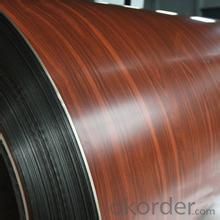
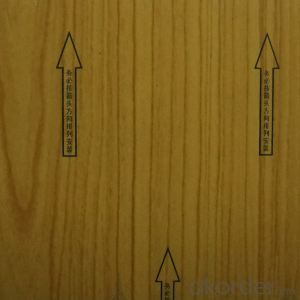
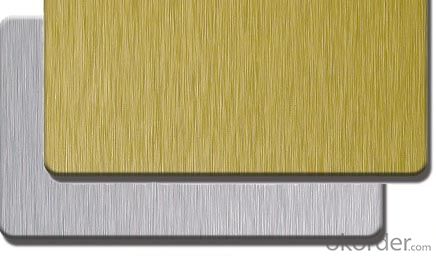
Specifications of Aluminium Prepainted Sheet/Coil Hot Saled:
Alloy | A1100,A3003, A8011 etc |
Temper | H16,H18,H26 |
Thickness | 0.02-3.0mm |
Width | Standard width:1200 1240mm |
30mm-1500mm | |
Diameter | Outside dia:1200mm\1000mm\1240 |
Interior dia: 405mm,505mm | |
Weight | 1.5T/coil,2.5 T/coil,3.0 T/coil |
Coating | PE, PVDF, |
Surface | Color coated, Embossed, mill finish, |
Color | As to RAL |
Gloss | 10 - 90%(EN ISO-2813:1994) |
Coating Thickness | P E : more than 18 micron |
PVDF: more than 25 micron | |
Coating Hardness (pencil resistance) | More than 2h |
Coating adhesion | 5J(EN ISO-2409:1994) |
Impact Resistance | No peeling or cracking(50 kg/cm,ASTMD-2794:1993) |
Flexibility (T-bend) | 2T |
MEK resistance | More than 100 |
FAQ of Aluminium Prepainted Sheet/Coil Hot Saled :
a.What is monthly capacity
---CNBM is one stated own company and our monthly capacity is about 2000tons.
b. Now which countries do you export your goods?
---Now we export to South East Asia,Africa, North America,South America ect.
- Q: Can aluminum coils be used in automotive suspension systems?
- Automotive suspension systems can utilize aluminum coils. Aluminum, a lightweight and sturdy material, provides numerous advantages for suspension components. Its high strength-to-weight ratio allows it to handle heavy loads without burdening the vehicle with unnecessary weight. This can enhance fuel efficiency and overall performance. Furthermore, aluminum is resistant to corrosion, making it particularly valuable for automotive suspension systems exposed to harsh weather conditions and road debris. By incorporating aluminum coils, manufacturers can ensure that suspension components have a longer lifespan and require less maintenance. In addition, aluminum coils possess superior heat absorption and dissipation capabilities compared to materials like steel. This aids in preventing overheating and mitigating the risk of suspension failure, especially during intense driving conditions or off-road usage. However, it is important to note that the use of aluminum coils in automotive suspension systems may entail certain compromises. Although aluminum is lighter and more resistant to corrosion, it may not be as strong as steel. Therefore, manufacturers must meticulously design and engineer the suspension system to ensure it can withstand necessary loads and provide sufficient support and stability for the vehicle. In summary, aluminum coils can be effectively employed in automotive suspension systems, offering benefits such as lightweight construction, corrosion resistance, and efficient heat dissipation. Nevertheless, manufacturers must carefully consider the specific requirements and trade-offs associated with aluminum usage in suspension components to ensure optimal performance and safety.
- Q: What is the role of aluminum coils in the construction of ships?
- Aluminum coils play a crucial role in the construction of ships, particularly in the marine industry. These coils are used to manufacture various components and structures that are essential for shipbuilding. One of the main advantages of using aluminum coils in ship construction is their lightweight nature. Aluminum is significantly lighter than traditional steel, which allows for increased fuel efficiency and better overall performance of the ship. This is particularly important for larger vessels, as reducing weight helps to minimize energy consumption and operating costs. Additionally, aluminum coils offer excellent corrosion resistance, making them ideal for the marine environment. Ships constantly face exposure to saltwater, which can be highly corrosive to metals. By using aluminum coils, shipbuilders can ensure that their vessels are better protected against rust and corrosion, ultimately increasing their lifespan and reducing maintenance requirements. Moreover, aluminum coils can be easily shaped and formed into various structures, offering greater design flexibility for shipbuilders. This versatility allows for the creation of complex and intricate ship components, such as hulls, superstructures, and bulkheads. Aluminum's excellent weldability also makes it easier to join different sections of the ship together, resulting in a more efficient and streamlined construction process. Furthermore, aluminum is a highly sustainable material. It is 100% recyclable, meaning that it can be reused without any loss in quality or performance. This makes aluminum coils an environmentally friendly choice for ship construction, aligning with the increasing emphasis on sustainability in the industry. In summary, the role of aluminum coils in ship construction is multifaceted. They provide lightweight, corrosion-resistant, and easily formable materials that contribute to improved fuel efficiency, durability, and design flexibility. Moreover, their recyclability makes them an environmentally conscious option. Overall, aluminum coils are a vital component in building ships that are efficient, durable, and sustainable.
- Q: My front door is scraping the aluminum frame door jam thing on the bottom. Also underneith the door itself it seems like there is a huge aluminum device covering the whole bottom of it and an aluminum weather stipper built into that. Is my only option to have the door pulled off. Or could I maybe grind of file down the aluminum on the bottom?
- You okorder /
- Q: In my line of work I see aluminum ground lugs, bonding nuts and straps and also neutral bars eat copper up, especially when exposed to the elements. I know how galvanic reaction works between elements under current load, but my question is why do aluminum and copper seem to hate each other more than any other? And, why would they still be required in usage together per NEC code?
- This problem arises between various metals such as iron aluminium where some form of plastic barrier is needed to stop electrochemical reaction taking place where these metals are in long term contact with each other especially in a wet environment. As far as aluminium copper are concerned, the difference in their chemical reactivity is particularly large; aluminium is a highly reactive metal that quickly becomes dull by coating itself with a very thin layer of aluminium oxide whilst copper is one of the least reactive of all metals. However, once covered with a fine layer of aluminium oxide, aluminium will tend not to corrode further. The effect of this is that any copper that does go into solution as a result of contact with weak atmospheric acids will very readily precipitate again as metallic copper onto the aluminium. Reactions similar to those below will readily take place: H2O (rain) + CO2 --- H2CO3 (carbonic acid - carbon dioxide dissolved in rain water) Cu + H2CO3 --- CuCO3 + H2 In an aqueous environment, 3 CuCO3 + 2 Al --- Al2(CO3)3 + 3 Cu Copper aluminium are regularly used because they are relatively low cost when compared with potential alternatives, even with recent commodity price increases. Toughened plastic has replaced copper in certain plumbing applications which have obviously eliminated this galvanic reaction problem.
- Q: Is there any way aluminum can affect you if its absorbed into your body either by digestion, through an open cut, or even through breathing it in?Most likely inhaling it would surely affect you, but what about the other two?
- Aluminium can accumulate in the brain possibly causing alzheimers. If you inhaled it it would poison you and damage your lungs, if you got it in your body it would damage your skin, possibly cause an infection and the cut might not heal. Aluminium is a solid so how could you accidently get it in your body unless you have been melting it etc? If it wasn't solid it would burn you if you got it on your skin. You can only inhale vapours not a metal. If you ate it then it would probably damage or clog up your insides otherwise just pass out in a stool, depends how much you ate. People eat from aluminium and touch it every day so it is not dangerous to be in contact with.
- Q: Can aluminum coils be used for food processing equipment?
- Yes, aluminum coils can be used for food processing equipment. Aluminum is a popular material choice for its excellent heat transfer properties, corrosion resistance, and lightweight nature. It is commonly used in the construction of food processing equipment such as heat exchangers, evaporators, and condensers.
- Q: How to calculate the weight of strips with the weight of aluminum coil known?
- Thickness*width*length=weight/density, length=weight/(density*thickness*width).Ps: Keep unit the same.
- Q: Are aluminum coils applicable in the manufacturing process of automobiles?
- <p>Yes, aluminum coils are widely used in automobile manufacturing. They are utilized in various components such as engine parts, body panels, and wheels due to their lightweight, corrosion resistance, and strength. Aluminum's recyclability and energy efficiency also make it an environmentally friendly choice for the automotive industry.</p>
- Q: Is it safe to use steel wires for making jewelry or decorative items, and are there any potential health hazards associated with it?
- <p>Using steel wires for jewelry or decorations generally poses minimal health risks when used properly. However, there are a few considerations: allergic reactions can occur in individuals sensitive to nickel, which is often found in stainless steel. Additionally, improper use or sharp edges can lead to cuts or injuries. It's important to ensure that the steel is of high quality and that any jewelry made is smooth and free of sharp points to minimize the risk of injury. Regular cleaning and maintenance are also recommended to prevent any potential health risks associated with bacteria buildup or skin irritation.</p>
- Q: Is it possible to use a saw to cut aluminum coils?
- <p>Yes, aluminum coils can be cut with a saw, but it's important to use the right type of saw. A hacksaw or a fine-toothed metal cutting saw is suitable for cutting aluminum. Lubrication is also crucial to reduce friction and prevent the saw blade from overheating. When cutting aluminum, it's advisable to use a cutting fluid or a light machine oil to keep the blade cool and ensure a clean, smooth cut. Always follow safety precautions and wear appropriate protective gear when cutting metal.</p>
Send your message to us
Aluminum Sheet and Coil - Prepainted Aluminum Sheet/Coil Hot Sale
- Loading Port:
- Shanghai
- Payment Terms:
- TT OR LC
- Min Order Qty:
- 5 m.t.
- Supply Capability:
- 2000 m.t./month
OKorder Service Pledge
OKorder Financial Service
Similar products
Hot products
Hot Searches
Related keywords
